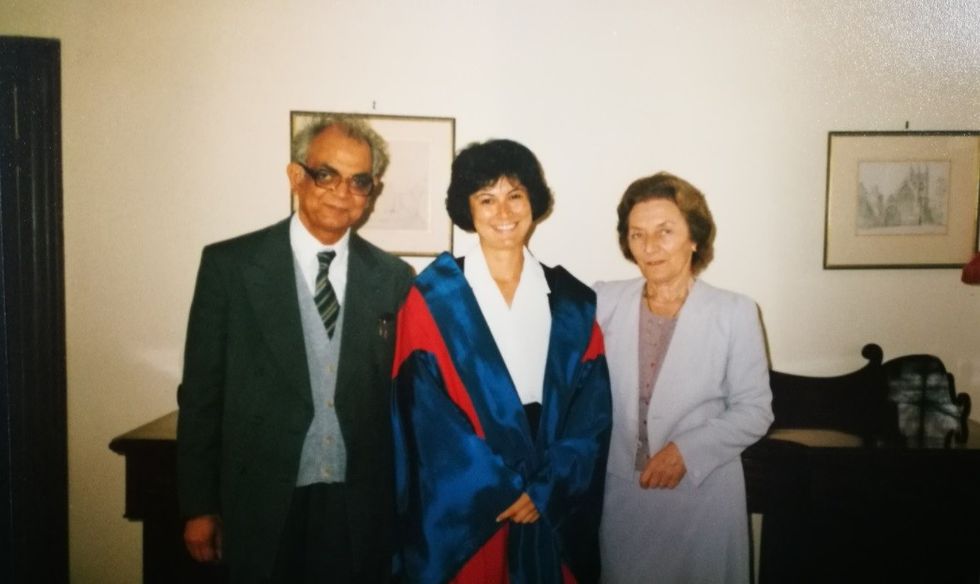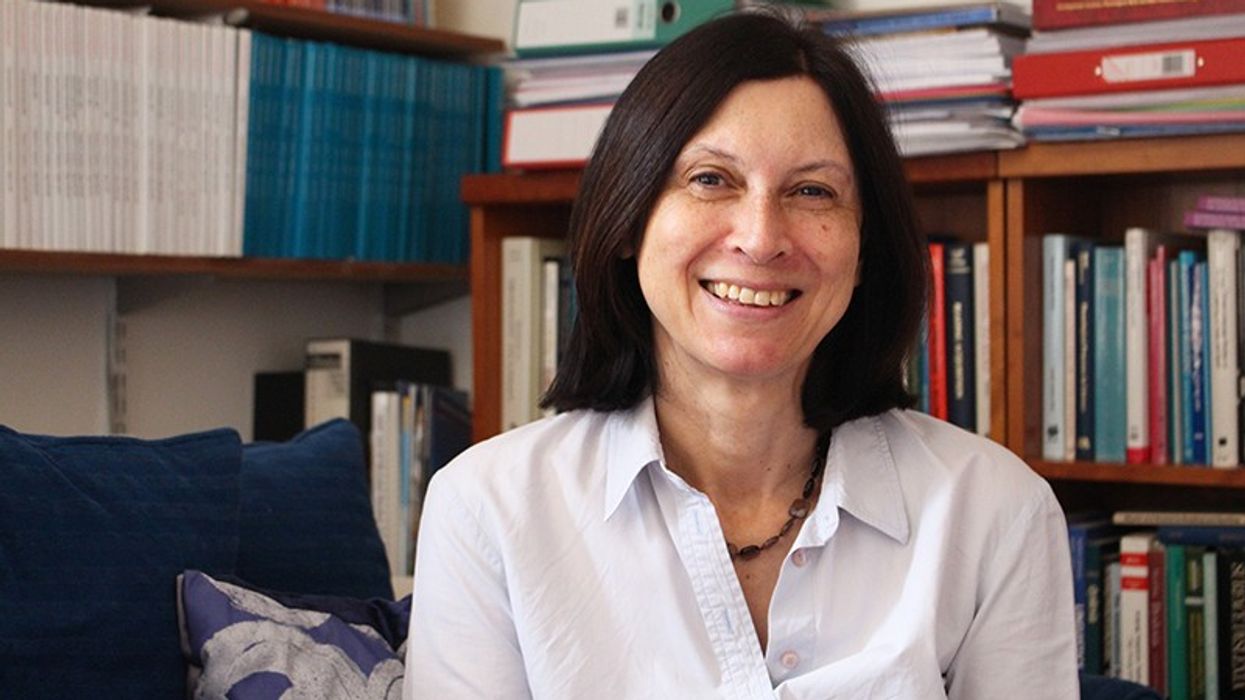By Amit Roy
AN INDIAN-ORIGIN academic who was once told she was not good enough for Oxford has spoken of the hurdles she had to overcome as she was elected a fellow of the Royal Society last week.
Usha Goswami is currently a fellow of St John’s College, Cambridge, and professor of cognitive developmental neuroscience at the Department of Psychology at Cambridge University.
Some of her cutting-edge research has been in the field of dyslexic children.
Asked whether they could be helped if they wore a hearing-aid type of device, Goswami told Eastern Eye: “That would be the idea. If we can get the signal processing to work, then it would enable something that you just put in an aid that could hook over the ear. Then these children from babyhood would be getting the same kind of sound input as everybody else – that would be the ultimate goal.”
If Goswami managed to invent such a device that transforms the lives of tens of millions of children across the world – they are often wrongly and cruelly dismissed by teachers and even parents as “stupid” – she would be a serious candidate for a Nobel Prize.
She emphasises that children should never be blamed for dyslexia – the problem lies in the way their brain processes sound in a way that is markedly different from other children.
Goswami explained the work which has earned her Fellowship of the Royal Society, the world’s most prestigious gathering of scientists: “I think the most important thing to get across is that dyslexia is a speech sound processing problem. These children hear speech differently to other children, that’s really been my big demonstration.
“The reason we tend to think dyslexia is a problem with print is because reading is processing speech when it’s written down with a visual code.
“It’s been known for a long time that children with dyslexia find it hard to decide whether words rhyme with each other, whether they begin with the same sounds as each other. They can’t count syllables in words.”
She made a surprising observation about dyslexia: “There can be strengths to being dyslexic. In the press last week, they were talking about how MI6 is actively looking for dyslexics now because they have realised that individuals with dyslexia think in different ways. They are not quite so linear and sort of step by step, they are much more thinking outside the box. And that’s been recognised to be an important skill now.
“So another way of thinking about this is if you get the diagnosis for the child, then at least they don’t feel that it’s their fault and they’re stupid. They can decide whether they want to normalise this system or not.”

The new president of the Royal Society, Sir Adrian Smith, who took over from the Nobel Prize winner Venkatraman Ramakrishnan in December last year, said: “Our (60) new fellows and foreign mem[1]bers are all at the forefronts of their fields – from molecular genetics and cancer research to tropical open ecosystems and radar technology.”
Goswami’s is an inspiring tale given the hurdles she has had to overcome. She was born in London on February 21, 1960, to an Indian father, Roshan Lal Goswami, and a German mother, Elisabeth Irene Zenner, and grew up in a working class area in Colindale in north London.
Her father, an electrical engineer, was born in Gujrat, now in Punjab, Pakistan, but grew up in Kenya and Uganda. He did some of his schooling in India and a master’s course in London. He joined the Indian High Commission on the supply mission side and was sent to Germany to work on reparations to India. That was where he met his wife, who had a degree in Russian and English and was doing simultaneous translations during the reparation negotiations.
“They got married and lived in Germany for a year,” said Goswami.
“He was posted back to London in 1949, and they lived there for the rest of their lives. Because he was paid the same as a Delhi civil servant, we had very little money when I was a child. That’s why we got to live in a very modest way. My mother died relatively young from cancer. My father lived with me in Cambridge, until he died, aged 84, in 2006, so he did attend my inaugural professorial lecture.”
Initially, Goswami attended St David’s, a local comprehensive which merged in 1971 with Hendon County Grammar School a couple miles away to form a larger comprehensive, Hendon School.
She recalled that St David was “a very rough school. For the first three years, I was at a school where you were really bullied for being clever – it wasn’t good to be clever.”
However, the culture at Hendon School, where Goswami did her O and A-levels between 1975 and 1978, was not aspirational either.
“I wanted to start a debating society in the sixth form with one of my friends, and the teacher said, ‘Why do children like you want a debating society?’ There was a real poverty of aspiration for us, which, when you look back, is very sad.”
At first, she applied to Manchester and Southampton universities – Oxbridge was beyond her dreams. But when she got A grades at A-level in English, economics and history and a C in mathematics, she was encouraged by a cousin to consider Oxford. But the head of sixth form sought to crush the idea: “Now, Usha, why do you want to go to Oxford? I see you going to the University of Manchester and getting a 2:2.”
Fortunately, a friend at Wycombe Abbey, a well-known public school, urged her to write direct to Oxford colleges. Two turned her down, but Peter Bryant, a don at St John’s College, Oxford, telephoned her: “Come along on Friday, I’ll give you an interview.”
It was the first year that St John’s was taking women. Goswami, who wanted to read experimental psychology – “the maths A-level helped” – said: “When I look back, I was so naive. I didn’t do any preparations. I didn’t know what to prepare. But he basically gave me some classic psychology experiments and said, ‘Why do you think those results came out?’ So you have to think critically about issues in psychology and offer your views. That’s what the interview was – a discussion about ideas and how to think. They decided to take a chance on me. I have Peter Bryant to thank for that.”
Bryant was her supervisor when Goswami returned to Oxford to do a DPhil after studying for a primary PGCE (Postgraduate Certificate in Education) at London University. Her interests eventually led her to establish the first-ever Centre for Neuroscience in Education at Cambridge in 2003, using an imaging device to measure brain activity to map parts of the brain as it acquires speech.
In September 2019, she was awarded the £3 million Yidan Prize – an education award established by the Chinese billionaire and tech entrepreneur Charles Chen Yidan – for her research into children’s language development and dyslexia.
Goswami, the schoolgirl who was once discouraged from applying for a place at Oxford, received a CBE in the 2021 New Year Honours list “for services to educational research”.




